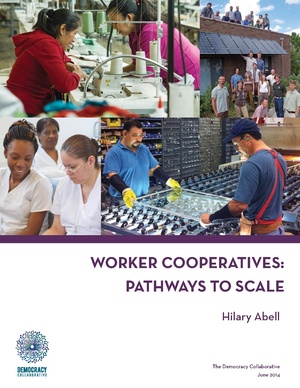Difference between revisions of "Coop"
m (fix typo) |
|||
| (4 intermediate revisions by the same user not shown) | |||
| Line 9: | Line 9: | ||
A co-operative is an autonomous association of persons united voluntarily to meet their common economic, social, and cultural needs and aspirations through a jointly-owned and democratically-controlled enterprise. | A co-operative is an autonomous association of persons united voluntarily to meet their common economic, social, and cultural needs and aspirations through a jointly-owned and democratically-controlled enterprise. | ||
| − | === | + | == Bylaws == |
| − | |||
| − | |||
| − | |||
| − | |||
| − | + | [https://loconomics.gitbooks.io/loconomics-cooperative-bylaws/content/ Loconomics Cooperative, Inc. Bylaws] | |
| − | + | [[File:Loconomics-cooperative-bylaws.pdf|thumb]] | |
| − | |||
| − | |||
| − | |||
| − | |||
| − | |||
| − | |||
== Values == | == Values == | ||
| Line 29: | Line 19: | ||
== Principles == | == Principles == | ||
| − | + | The co-operative principles are guidelines by which co-operatives put their values into practice. | |
| + | <ol> | ||
| + | <li> '''Voluntary and Open Membership''' <br /> | ||
| + | Co-operatives are voluntary organisations, open to all persons able to use their services and willing to accept the responsibilities of membership, without gender, social, racial, political or religious discrimination. | ||
| + | |||
| + | <li> '''Democratic Member Control''' <br /> | ||
| + | Co-operatives are democratic organisations controlled by their members, who actively participate in setting their policies and making decisions. Men and women serving as elected representatives are accountable to the membership. In primary co-operatives members have equal voting rights (one member, one vote) and co-operatives at other levels are also organised in a democratic manner. | ||
| + | |||
| + | <li> '''Member Economic Participation''' <br /> | ||
| + | Members contribute equitably to, and democratically control, the capital of their co-operative. At least part of that capital is usually the common property of the co-operative. Members usually receive limited compensation, if any, on capital subscribed as a condition of membership. Members allocate surpluses for any or all of the following purposes: developing their co-operative, possibly by setting up reserves, part of which at least would be indivisible; benefiting members in proportion to their transactions with the co-operative; and supporting other activities approved by the membership. | ||
| + | |||
| + | <li> '''Autonomy and Independence''' <br /> | ||
| + | Co-operatives are autonomous, self-help organisations controlled by their members. If they enter to agreements with other organisations, including governments, or raise capital from external sources, they do so on terms that ensure democratic control by their members and maintain their co-operative autonomy. | ||
| + | |||
| + | <li> '''Education, Training and Information''' <br /> | ||
| + | Co-operatives provide education and training for their members, elected representatives, managers, and employees so they can contribute effectively to the development of their co-operatives. They inform the general public - particularly young people and opinion leaders - about the nature and benefits of co-operation. | ||
| + | |||
| + | <li> '''Co-operation among Co-operatives''' <br /> | ||
| + | Co-operatives serve their members most effectively and strengthen the co-operative movement by working together through local, national, regional and international structures. | ||
| + | |||
| + | <li> '''Concern for Community''' <br /> | ||
| + | Co-operatives work for the sustainable development of their communities through policies approved by their members. | ||
| + | </ol> | ||
== Local == | == Local == | ||
* http://www.meetup.com/agaric/ | * http://www.meetup.com/agaric/ | ||
| − | |||
| − | |||
| − | |||
== North America == | == North America == | ||
| − | * | + | * https://www.techworker.coop/ |
== Global == | == Global == | ||
| − | |||
* https://community.coops.tech/t/a-proposal-for-a-global-co-operative-it-network-from-the-ica/1171 | * https://community.coops.tech/t/a-proposal-for-a-global-co-operative-it-network-from-the-ica/1171 | ||
| + | |||
* https://www.civicoop.org/ - Netherlands - [[CiviCRM]] cooperative that helped with [https://www.wikimedia.nl/ Wikimedia Netherlands] | * https://www.civicoop.org/ - Netherlands - [[CiviCRM]] cooperative that helped with [https://www.wikimedia.nl/ Wikimedia Netherlands] | ||
* https://www.symbiotic.coop/ - Montreal Canada - [[CiviCRM]] cooperative | * https://www.symbiotic.coop/ - Montreal Canada - [[CiviCRM]] cooperative | ||
Revision as of 10:11, 22 January 2019
Since 1882, Harvard and MIT have had their Coop. In the 70's, we had food co-ops (they're still around you know[1]). Now the worker collaborative has emerged as the new co-operative for the new century.
The International Co-operative Alliance (www.ica.coop) represents close to one billion individual members. Cooperatives generate partial or full-time employment for at least 250 million people worldwide, and make up 12% of the entire employed population of the G20 countries. The 2,000 co-operatives in the 65 countries surveyed by the World Cooperative Monitor totals 2.6 trillion USD.
Although we hear relatively little about the cooperative sector in the United States, it is actually the country with the largest number of members represented by the International Co-operative Alliance. There are nearly 30,000 cooperatives in the United States, with 256 million members and over two million jobs.
Contents
Definition[edit | edit source]
- International Co-operative Alliance Statement on the Cooperative Identity
A co-operative is an autonomous association of persons united voluntarily to meet their common economic, social, and cultural needs and aspirations through a jointly-owned and democratically-controlled enterprise.
Bylaws[edit | edit source]
Loconomics Cooperative, Inc. Bylaws
File:Loconomics-cooperative-bylaws.pdf
Values[edit | edit source]
Co-operatives are based on the values of self-help, self-responsibility, democracy, equality, equity and solidarity. In the tradition of their founders, co-operative members believe in the ethical values of honesty, openness, social responsibility and caring for others.
Principles[edit | edit source]
The co-operative principles are guidelines by which co-operatives put their values into practice.
- Voluntary and Open Membership
Co-operatives are voluntary organisations, open to all persons able to use their services and willing to accept the responsibilities of membership, without gender, social, racial, political or religious discrimination. - Democratic Member Control
Co-operatives are democratic organisations controlled by their members, who actively participate in setting their policies and making decisions. Men and women serving as elected representatives are accountable to the membership. In primary co-operatives members have equal voting rights (one member, one vote) and co-operatives at other levels are also organised in a democratic manner. - Member Economic Participation
Members contribute equitably to, and democratically control, the capital of their co-operative. At least part of that capital is usually the common property of the co-operative. Members usually receive limited compensation, if any, on capital subscribed as a condition of membership. Members allocate surpluses for any or all of the following purposes: developing their co-operative, possibly by setting up reserves, part of which at least would be indivisible; benefiting members in proportion to their transactions with the co-operative; and supporting other activities approved by the membership. - Autonomy and Independence
Co-operatives are autonomous, self-help organisations controlled by their members. If they enter to agreements with other organisations, including governments, or raise capital from external sources, they do so on terms that ensure democratic control by their members and maintain their co-operative autonomy. - Education, Training and Information
Co-operatives provide education and training for their members, elected representatives, managers, and employees so they can contribute effectively to the development of their co-operatives. They inform the general public - particularly young people and opinion leaders - about the nature and benefits of co-operation. - Co-operation among Co-operatives
Co-operatives serve their members most effectively and strengthen the co-operative movement by working together through local, national, regional and international structures. - Concern for Community
Co-operatives work for the sustainable development of their communities through policies approved by their members.
Local[edit | edit source]
North America[edit | edit source]
Global[edit | edit source]
- https://www.civicoop.org/ - Netherlands - CiviCRM cooperative that helped with Wikimedia Netherlands
- https://www.symbiotic.coop/ - Montreal Canada - CiviCRM cooperative
Learn[edit | edit source]
Industry[edit | edit source]
- http://ica.coop/ International Co-operative Alliance

- http://www.cooperativedifference.coop/ in Canada
- https://usworker.coop/ US Federation of Worker Cooperatives
- http://worcn.org/ Worker-Owned and Run Cooperative Network of Greater Boston
- http://valleyworker.org/ Valley Alliance of Worker Co-operatives
- http://www.geo.coop/about Grassroots Economic Organizing (GEO)
- http://www.umasscec.org/ UMass Cooperative Enterprise Collaborative
- http://cooperative-curriculum.wikispaces.com/ Babson College and a whole bunch of other Universities
- https://community-wealth.org/content/cooperatives-0
MBA[edit | edit source]
Info[edit | edit source]
- http://democracycollaborative.org/content/worker-cooperatives-origin-stories-and-development-strategies
- http://democracycollaborative.org/content/worker-cooperatives-pathways-scale
References[edit source]
- ↑ There are cooperatives in food, retail, housing, credit-unions, labor, renewable energy etc.

